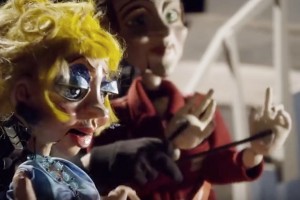Chicago’s Digital Hydra creates 3rd season of hit Middle Eastern show
Published in Reel Chicago, September 2015
![]()

A still from “Wamahyaya”
With the help of a courageous client and a knack for innovative cinematic metaphors, Chicago production firm Digital Hydra recently gave the Arabic world a TV show like it’s never seen before.
Hired in March to create a new look for the third season of WaMahyaya, a popular science and philosophy program hosted by Saudi media personality Dr. Walid Fitaihi, partners Hamzah Jamjoom and Patrick Wimp decided that interpreting his on-air advice with marionettes and fencing matches was a bold but feasible way to go.
By the end of July, tens of millions of viewers had proven them right.
To hear Jamjoom explain it, the solution was obvious. “How do we make the show appealing to someone who’s not interested?” he asks. “Make it visually fascinating to everybody.”
Shooting interiors in Resolution Digital Studios and exteriors in New Buffalo, Michigan, the Digital Hydra crew transformed substantial components of the season’s theme, taming the ego, into artistic and emotional drama captured on RED Epic Dragons. Marionettes were tied down by the constraints that egos place within the family. Fencers fought with styles representing the conflicts of the past, present and future. Underwater revelations and a trip through a magic looking glass were among the other techniques that found their way into the 15 fifteen-minute episodes that the partners sketched out in their Cinespace office suite before heading into production.

Patrick Wimp and Hamzah Jamjoom
Assisting from concept to completion were executive producer Jacquelyn Jamjoom (Hamzah’s wife) and freelance DP Ross Heran, both of whom, like Jamjoom and Wimp, graduated from DePaul’s film school.
NoiseFloor’s Devin Delaney composed the audio track that begins and ends each episode. Digital Kitchen’s Tim Little partnered with Hamzah to create the opening title sequence. RDS handled the editing with Bryen Hensley supervising sound design. Daufenbach Camera supplied lenses and accessories.
Hamzah, who was born and raised in Saudi Arabia, oversaw the entire process. Along the way, he recalls thinking, “Are we pushing the limits too much here?” But in fact it was their client who was taking the greatest risk.
Before scratching out idea one, Digital Hydra convinced Fitaihi, a man known to some as “the Dr. Phil of the Middle East,” to modify the style that had made his show a success for two seasons running. Specifically, they told him to open up and talk about himself, to reveal his own struggles with the ego, while advising a huge, conservative, religious audience on delicate matters of behavior health.
Like most entertainment consumers outside of America, Middle Eastern viewers are not amused by people who give out too much information.
“There’s a huge distinction between what happens publicly and what happens privately,” explains Jamjoom. “But Dr. Fitaihi did it in a very elegant, classy way.”
WaMahyaya aired on eight channels owned by Saudi networks Rotana and OSN throughout Ramadan, an occasion that Hamzah calls “the Super Bowl of the Middle East.”
“It is a month when everybody gathers to break their fast with their family members and usually watch a positive TV show,” he says. “After the meal is done, people will immediately discuss what they have seen.”
In this case, the discussion ranged from Morocco to Indonesia and included nearly a billion people. But it won’t end there. Digital Hydra plans to release an English version of the show this winter.
Top image by Digital Hydra · Photo by Dan Patton